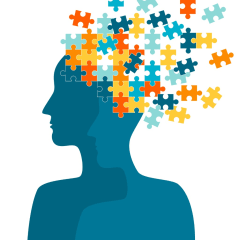Why the Best Psychologist in Delhi Can Change Your Psychological Health
Why the Best Psychologist in Delhi Can Change Your Psychological Health
Blog Article
Psych Treatment: A Comprehensive Guide to Methods and Results

Cognitive-Behavioral Therapy
Cognitive-Behavioral Treatment (CBT) is a widely used psychotherapeutic strategy that focuses on recognizing and customizing inefficient reasoning and behavior patterns. Established in the 1960s by Aaron T. Beck, CBT integrates behavior and cognitive theories to address different psychological wellness concerns, consisting of depression, anxiety, and stress-related disorders.
CBT is identified by its organized, goal-oriented nature. Therapy commonly includes a collaborative process in between the therapist and customer, where particular problems are recognized, and functional techniques are created to resolve them. Techniques such as cognitive restructuring, direct exposure therapy, and skill-building exercises are commonly used. Cognitive restructuring involves tough and changing negative idea patterns, while exposure treatment aims to minimize worry and stress and anxiety with gradual direct exposure to been afraid items or situations.
Evidence-based research study sustains the efficiency of CBT for a wide variety of emotional problems - Best Psychologist in Delhi. Its emphasis on skill acquisition and self-help methods equips customers to continue development separately after treatment ends. The adaptability and effectiveness of CBT have actually made it a foundation in modern psychotherapeutic practice
Psychodynamic Methods
Rooted in the very early concepts of Sigmund Freud, psychodynamic strategies concentrate on checking out the unconscious mind and its influence on habits and feelings. These approaches intend to uncover covert ideas and sensations that might be driving maladaptive behaviors and emotional distress. Central to this method is the idea of inner problem, often originating from unresolved past experiences, specifically those from youth.
Therapists making use of psychodynamic methods utilize several vital techniques, consisting of totally free organization, where people are motivated to talk openly to disclose unconscious product, and dream evaluation, which interprets the unexposed material of dreams. Furthermore, the exploration of transference and countertransference dynamics within the therapeutic connection is critical. These interactions can give understandings into the individual's interior globe and relational patterns.
Psychodynamic therapy is usually longer-term compared to other methods, providing a extensive and deep understanding of the individual's psyche. Study indicates that it can be specifically reliable for intricate mental health problems, such as individuality conditions and persistent depression. By promoting self-awareness and emotional understanding, psychodynamic therapy seeks to bring unconscious material to awareness, making it possible for individuals to accomplish significant and long lasting adjustment in their lives.
Humanistic Techniques
Building on the structures laid by psychodynamic techniques, humanistic techniques provide a distinctive point of view concentrated on specific possible and self-actualization. Originating in the mid-20th century, these techniques prioritize the fundamental goodness and growth capacity of individuals, highlighting an alternative sight of human experience. Key numbers such as Carl Rogers and Abraham Maslow have substantially affected this therapeutic technique, which incorporates approaches like client-centered therapy and Gestalt therapy.
Client-centered therapy, created by Rogers, plays a crucial function in humanistic methods. The therapist's role is even more of a facilitator than an authority, urging clients to harness their internal resources for healing.
Gestalt treatment, an additional important humanistic method, stresses existing moment understanding and the assimilation of mind and body. By concentrating on the "below and currently," customers get greater insight right into their existing emotions and behaviors. Methods such as role-playing and assisted visualization are often used to help customers go to this site acquire a much deeper understanding of themselves, ultimately leading to improved self-awareness and fulfillment.
Integrative Treatments
Integrative treatments stand for a synthesis of numerous healing strategies tailored to meet the distinct demands of each customer. This strategy acknowledges the intricacy of human psychology and the complex nature of mental wellness issues. By combining aspects from different colleges of psychiatric therapy-- such as cognitive-behavioral therapy (CBT), psychodynamic treatment, and humanistic methods-- integrative therapies use a more flexible and holistic treatment standard.
Professionals of integrative treatment analyze each client's certain requirements, signs, and individual history to design a tailored therapy strategy. This individualized technique boosts the potential for therapeutic success by dealing with the origin of psychological distress and advertising overall health. Methods may consist of mindfulness exercises, cognitive restructuring, and psychological handling, each chosen to target various facets of the customer's concerns.
Moreover, integrative therapies emphasize the restorative connection, checking out the client-therapist bond as a critical part of efficient treatment. This partnership cultivates a helpful setting where customers really feel safe to check Click Here out and resolve their problems. The adaptability of integrative therapies makes them appropriate for a wide variety of problems, consisting of anxiety, clinical depression, injury, and interpersonal troubles, thereby enhancing their applicability and effectiveness in diverse professional settings.

Measuring Treatment Results
Assessing the efficiency of psychotherapy is important for both clinicians and clients to ensure that the therapy is yielding the wanted end results. To imp source attain this, numerous approaches and devices are employed to determine therapy results systematically. Standardized analysis instruments, such as the Beck Clinical Depression Inventory (BDI) and the Generalized Anxiousness Disorder 7 (GAD-7), supply measurable data on signs and symptom severity and modifications over time.
Along with standard tools, qualitative approaches like customer self-reports and medical interviews use beneficial insights into the personal experiences and regarded progress of clients. Consistently arranged evaluations, usually at the start, omphalos, and end of therapy, aid in tracking the trajectory of renovation or identifying areas requiring change.
End result measurement is not limited to sign reduction; it likewise incorporates useful improvements in day-to-day live, such as much better social partnerships, raised work productivity, and enhanced overall well-being. Modern developments in electronic health and wellness have actually presented mobile applications and on the internet platforms that assist in real-time tracking and comments, additionally fine-tuning the evaluation process.
Ultimately, an extensive method to measuring therapy end results ensures that therapeutic interventions are effective, efficient, and customized to fulfill the specific requirements of clients, thereby optimizing the total healing experience.
Final Thought
Humanistic techniques concentrate on individual growth and self-actualization, while integrative treatments combine several approaches for tailored therapy strategies. Examining therapy outcomes with standardized evaluations and qualitative methods guarantees a comprehensive understanding of performance, ultimately leading clients toward sustaining psychological health and wellness renovations.
From the organized method of Cognitive-Behavioral Treatment (CBT) to the deep expedition of the subconscious in psychodynamic therapy, each technique brings special advantages. Its focus on skill acquisition and self-help methods encourages customers to proceed progress separately after therapy wraps up (Best Psychologist in Delhi). Trick numbers such as Carl Rogers and Abraham Maslow have actually significantly influenced this restorative technique, which incorporates approaches like client-centered treatment and Gestalt treatment

Report this page